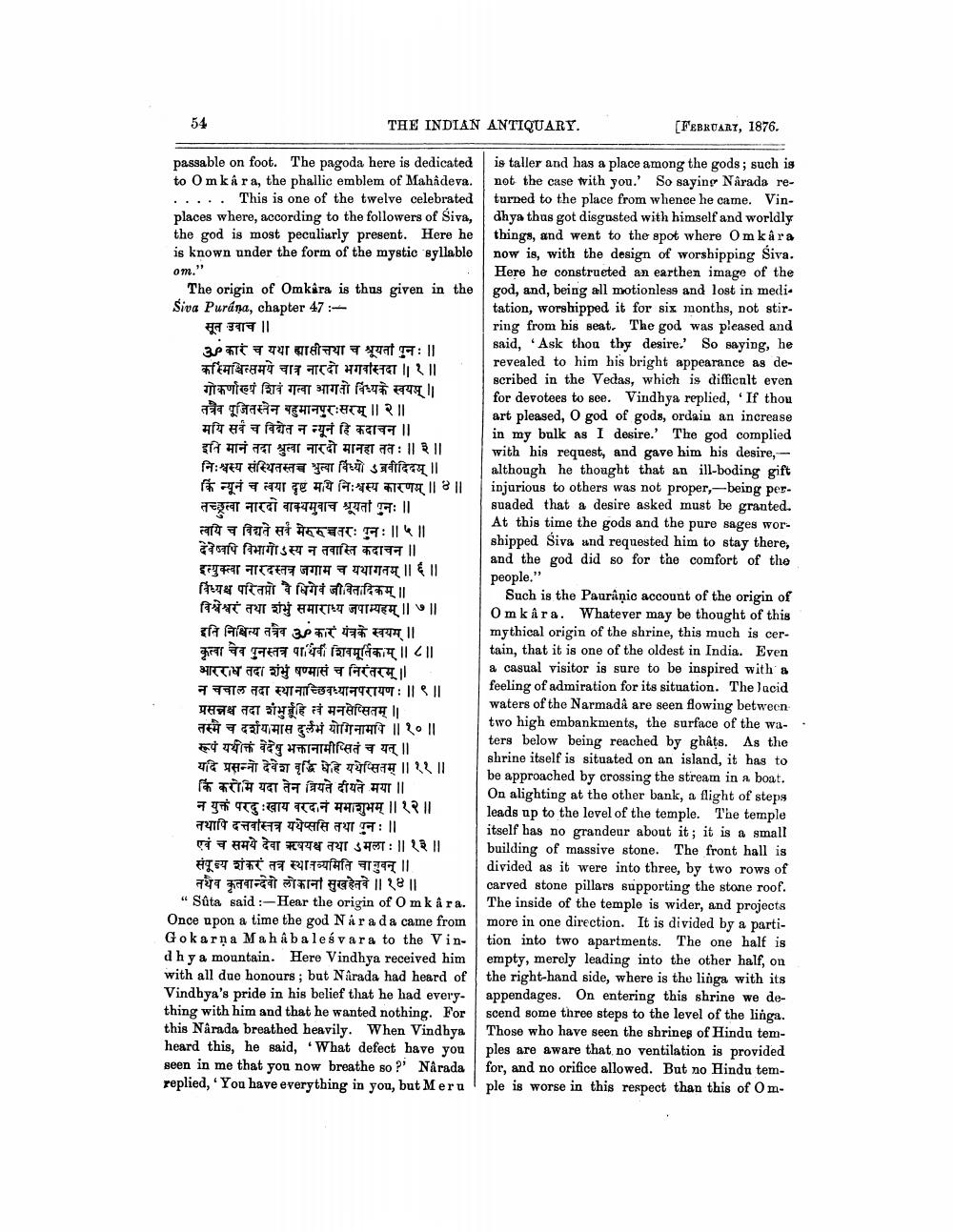________________
54
THE INDIAN ANTIQUARY.
[FEBRUARY, 1876.
is taller and has a place among the gods; such is not the case with you.' So saying Narada returned to the place from whence he came. Vindhya thus got disgusted with himself and worldly things, and went to the spot where Omkara now is, with the design of worshipping Siva. Here he constructed an earthen image of the
The origin of Omkara is thus given in the god, and, being all motionless and lost in medi Siva Purana, chapter 47:
tation, worshipped it for six months, not stirring from his seat. The god was pleased and said, 'Ask thou thy desire.' So saying, he revealed to him his bright appearance as described in the Vedas, which is difficult even for devotees to see. Vindhya replied, 'If thou art pleased, O god of gods, ordain an increase in my bulk as I desire.' The god complied with his request, and gave him his desire, although he thought that an ill-boding gift injurious to others was not proper,-being persuaded that a desire asked must be granted. At this time the gods and the pure sages worshipped Siva and requested him to stay there, and the god did so for the comfort of the people."
Such is the Pauranic account of the origin of Omkara. Whatever may be thought of this mythical origin of the shrine, this much is certain, that it is one of the oldest in India. Even a casual visitor is sure to be inspired with a feeling of admiration for its situation. The Jacid waters of the Narmadâ are seen flowing between two high embankments, the surface of the waters below being reached by ghâts. As the shrine itself is situated on an island, it has to be approached by crossing the stream in a boat. On alighting at the other bank, a flight of steps leads up to the level of the temple. The temple itself has no grandeur about it; it is a small building of massive stone. The front hall is divided as it were into three, by two rows of carved stone pillars supporting the stone roof. The inside of the temple is wider, and projects more in one direction. It is divided by a partition into two apartments. The one half is empty, merely leading into the other half, on the right-hand side, where is the linga with its appendages. On entering this shrine we descend some three steps to the level of the linga. Those who have seen the shrines of Hindu temples are aware that no ventilation is provided for, and no orifice allowed. But no Hindu temple is worse in this respect than this of Om
passable on foot. The pagoda here is dedicated to Om kà ra, the phallic emblem of Mahadeva. This is one of the twelve celebrated places where, according to the followers of Siva, the god is most peculiarly present. Here he is known under the form of the mystic syllable
om."
सूत उवाच ॥
ॐ कारं च यथा ह्यासीत्तथा च श्रूयतां पुनः ॥ कस्मिश्चित्समये चात्र नारदो भगवांस्तदा || १ || गोकर्णाख्यं शिवं गत्वा आगतो विंध्यके स्वयम् || तत्रैव पूजितस्तेन बहुमानपुरः सरम् || २ || मयि सर्व च विद्येत न न्यूनं हि कदाचन ॥
इति मानं तदा श्रुत्वा नारदो मानहा ततः ॥ ३ ॥ निःश्वस्य संस्थितस्तच्च श्रुत्वा विध्यो ऽब्रवीदिदम् || किं न्यूनं च त्वया दृष्ट मयि निःश्वस्य कारणम् ॥ ४ ॥ तच्छ्रुत्वा नारदो वाक्यमुवाच श्रूयतां पुनः ॥ त्वयि च विद्यते सर्व मेरुरुचतरः पुनः || ५ || देवेष्वधि विभागोऽस्य न तवास्ति कदाचन ॥ इत्युक्त्वा नारदस्तत्र जगाम च यथागतम् || ६ ॥ विंध्यक्ष परितमो वै धिवं जीवितादिकम् ॥ विश्वेश्वरं तथा शंभुं समाराध्य जपाम्यहम् ॥ ७ ॥ इति निश्चित्य तत्रैव ॐ कार यंत्र के स्वयम् ॥ कृत्वा चैव 'पुनस्तत्र पार्थिव शिवमूर्तिकाम् ॥ ८ ॥ आराध तदा शंभुं षण्मासं च निरंतरम् || न चचाल तदा स्था नाच्छिवध्यानपरायणः ॥ ९ ॥ प्रसन्नश्च तदा शंभुब्रूहि त्वं मनसेप्सितम् || तस्मै च दर्शयामास दुर्लभं योगिनामपि ॥ १० ॥ रूपं यथोक्तं वेदेषु भक्तानामीप्सितं च यत् ॥ यदि प्रसन्नो देवेश वृद्धिं हि यथेप्सितम् ॥ ११ ॥ किं करोमि यदा तेन व्रियते दीयते मया ॥
न युक्तं परदुःखाय वरदानं ममाशुभम् || १२ || तथापि दत्तवांस्तत्र यथेप्ससि तथा पुनः ॥ एवं च समये देवा ऋषयश्च तथा मला ॥ १३ ॥ संपूज्य शंकरं तत्र स्थानव्यमिति चानुवन् || तथैव कृतवान्देवो लोकानां सुखहेतवे || १४ || "Sûta said:-Hear the origin of Omkara. Once upon a time the god Nára da came from Gokarna Mahabales vara to the Vindhy a mountain. Here Vindhya received him with all due honours; but Nârada had heard of Vindhya's pride in his belief that he had everything with him and that he wanted nothing. For this Nârada breathed heavily. When Vindhya heard this, he said, 'What defect have you seen in me that you now breathe so ? Nârada replied, 'You have everything in you, but Meru




